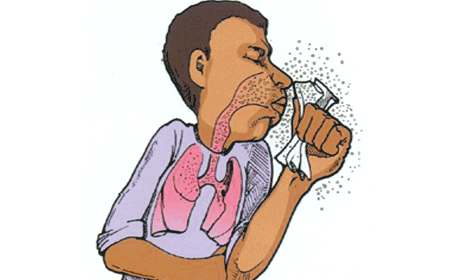Tuberculosis very troublesome in Belize
BELIZE CITY, Thurs. Mar. 22, 2018– Belize’s Ministry of Health marked World Tuberculosis Day, which is observed every year on March 24, with a health fair which was held today, Thursday, at the Battlefield Park in Belize City. The ministry noted in a press release that the “negative impact of tuberculosis (TB) in developing countries continues to be of significant concern as it is associated with high mortality rates in HIV positive persons,” and called on “everyone to lead the efforts in improving the response to ending TB.”
The Ministry of Health describes the tuberculosis reality in Belize as an “epidemic.”
According to the ministry’s press release, in 2017 there were “a total of 117 new cases of TB diagnosed nationally, of which 114 were pulmonary tuberculosis, and three were extra-pulmonary tuberculosis” and “the most affected age group continues to be between 20-49, as has been the case in previous years.”
In its release, the ministry also mentioned that 28 of the new cases that were diagnosed are HIV-positive persons (24%), and it noted that tuberculosis is “one of the leading causes of death in HIV positive persons, and in 2016, was responsible for about 40% of HIV deaths.”
The Ministry of Health has received support for the initiatives of its National Tuberculosis Program (NTBP) for 2016-2018 from the Global Fund. It says the program provides “high quality and effective drugs and other services free of cost to those affected with TB”; “training of health care personnel and laboratory staff locally and abroad in newer methods for diagnosing TB, providing TB treatment and care, and other areas of concern at the primary care level in all districts”; and “standardized treatment with supervision and support from adherence counselors in the most affected areas of the country.”
Information provided at the health fair indicated that 2,400 Belizeans were diagnosed with TB from 1997 to 2016, and there are 120 to 140 suspected cases every year. Tuberculosis is a curable, but contagious disease. It is caused by a bacteria that spreads through the air. Anyone can get TB, but persons living with HIV can get TB more easily because they have a weaker immune system. There were 4,268 persons living with HIV at the end of 2016, and there are 225-250 new HIV cases every year.
The NTBP says that the persons most susceptible to the disease are those with weak immune systems, and these include persons with HIV; those who had the infection in the last two years; persons who have diabetes or cancer, abuse alcohol or illegal drugs, or received incorrect treatment for a TB infection in the past; and the very old. Healthcare workers and caretakers are also at higher risk of contracting tuberculosis.
TB is not confined to the lungs and throat. The disease can also affect the brain, kidneys, and the spine. The symptoms of tuberculosis are weakness, sudden loss of weight, fever, and night sweats. Persons who have TB in the lungs may have chest pain, and severe coughs.
The NTBP says the disease is spread through the air, by people with the disease who cough, sneeze, laugh, sing, or spit. But it is not spread by sharing silverware or cups, sharing cigarettes, or kissing. This newspaper finds it strange that kissing a person who has the disease is perfectly safe, while there is a risk in being around a sick person who laughs or sings. However, that is the expert advice.
To avoid contracting tuberculosis, members of the public should know the symptoms of the disease, keep away from crowds, cover their mouths with a tissue or surgical mask when they cough or sneeze, and always stay in open well-ventilated areas and away from sick persons. If they do contract TB, they should take their treatment on time, keep follow-up appointments, and maintain good personal hygiene.
Persons can be infected with TB but not have the disease. In such infected persons, the TB bacteria is described as inactive, or “sleeping”, so the person doesn’t feel sick. In sick persons, the person’s body can’t fight off the disease. The person shows symptoms and can spread the disease to others. The WHO (World Health Organization) says “one-third of the world’s population has latent TB.” These are people who are infected by the bacteria but aren’t sick. These persons cannot transmit the disease. The WHO says that infected persons have a 10% chance of becoming sick with the disease in their lifetime.
Persons who get a test and are found to be infected with TB can get medication free of cost from any public health facility. This medication will prevent the “infection” from becoming TB disease.
While TB is a contagious, debilitating disease, and the Ministry of Health and its partners are working to contain it, it is not the death sentence it was in the 1800’s. Commonly known as “consumption” at that time, contracting it meant a slow “wasting away” of the sick person, until death. As mentioned earlier, TB is now curable.
The NTBP says that healthy people shouldn’t shun those who have the disease. The NTBP says that it is a myth that all sick persons must be placed in isolation wards. It is also not true that TB patients shouldn’t eat with the family during meals, and that patients can’t return to work or school.

